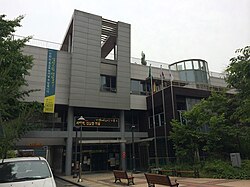Gayang-dong
Gayang-dong | |
|---|---|
| Korean transcription(s) | |
| • Hangul | 가양동 |
| • Hanja | 加陽洞 |
| • Revised Romanization | Gayang-dong |
| • McCune–Reischauer | Kayang-tong |
 Gayang 1-dong Community Service Center (Gangseo-gu) | |
| Country | South Korea |
| Area | |
• Total | 6.69 km2 (2.58 sq mi) |
| Population (2001)[1] | |
• Total | 65,809 |
| • Density | 9,837/km2 (25,480/sq mi) |
Gayang-dong (Korean: 가양동) is a dong (neighborhood) of Gangseo District, Seoul, South Korea.[1][2]
Overview
[edit]The name Gayang-dong originated from the combination of two former localities: Gamadong (加麻洞) and Goyang-ri (古陽里). The name was formed by taking the character "Ga" (加) from Gamadong and "Yang" (陽) from Goyang-ri.
The western region of the Han River, where Gayang-dong is located, corresponds to the historical area known as Michuhol. According to the Samguk Sagi, locations such as Inbeollo-hyeon (present-day Siheung), Jechapaeui-hyeon (present-day Gangseo District), and Maesohol-hyeon (present-day Incheon) were part of Michuhol. These references indicate that the area now known as Gangseo-gu has historical ties to the early Baekje kingdom.
On March 1, 1914, during a nationwide administrative reorganization under Japanese rule, several villages from Gunnae-myeon in Yangcheon-gun, Gyeonggi Province—including Hyanggyo-dong, Goyang-ri, Gamadong, Seongjaejeong-ri, and Gongam-ri—were merged to form Gayang-ri in Yangdong-myeon, Gimpo-gun.
On January 1, 1963, Gayang-ri was incorporated into Seoul and became part of Yeongdeungpo District. It was transferred to the newly established Gangseo District on September 1, 1977, following the division of Yeongdeungpo District. On April 1, 1993, Gayang-dong was subdivided into Gayang 1-dong, 2-dong, and 3-dong.
Attractions
[edit]See also
[edit]References
[edit]- ^ a b 가양동 (Gayang-dong 加陽洞) (in Korean). Doosan Encyclopedia. Retrieved 2008-04-19.[permanent dead link]
- ^ "The origin of Gayang-dong" (in Korean). Gangseo-gu official site. Retrieved 2008-04-19.[permanent dead link]
External links
[edit]- Gangseo-gu official website[permanent dead link]
- (in Korean) Gangseo-gu map at the Gangseo-gu official website
- (in Korean) Resident offices of Gangseo-gu


 French
French Deutsch
Deutsch